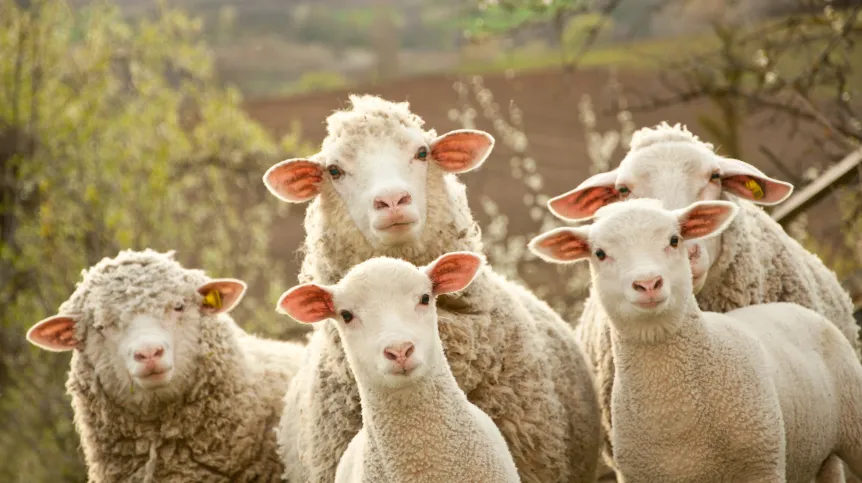
Research shows that our attitudes towards animals translate into our relationships with other people; this applies especially to people from groups perceived as 'alien', e.g. immigrants or national minorities, says Aleksandra Rabinovitch, PhD, from the Faculty of Psychology at SWPS University in Sopot.
The psychologist and her team are researching this issue and methods that can influence the change in our approach to animals, especially farm animals. In one of her latest papers, published in the September issue of the scientific journal Appetite, Dr. Rabinovitch observed, among other things, that giving an animal bred for meat a name and attributing other unique features to it makes children perceive them as more similar to humans and less likely to want to eat it.
PAP: After reading the paper about the study conducted by your team, one comes to think that people, including children, are only able to grant animals the right to suffer when they give them human characteristics - a name, some preferences, interests.
Dr Aleksandra Rabinovitch: I look at it a bit differently. Based on previous studies, it seems that perceiving animals as beings that do not experience suffering, pain, emotions - such as humans have - may be a defence mechanism. It is triggered when we have to justify to ourselves the fact that we use animals for our own purposes, e.g. we kill and eat them.
In the case of animals that we do not eat, we have no problem seeing that they are capable of beautiful behaviours, feeling pain, experiencing emotions. This is indicated by the results of studies in which information was manipulated that an animal is or is not consumed by people. Animals used for this purpose were the ones that the subjects - originating from Western culture - did not know. One group was informed that such a wild animal simply occured in nature, while the other group received information that it was used as a source of meat by local residents. As it turned out, the group informed that the animal was treated as potential food perceived it as less capable of feeling pain and suffering. They also believed that the animal deserved less human care. This may indicate that eating meat, which is associated with harming animals, causes cognitive dissonance in us and our mind often needs justification; it needs to transform the perception of a given animal so that we feel more comfortable without abandoning our previous dietary and other habits. We can then take away the ability of animals bred for meat to feel pain, for example. And the more meat products we consume, the less we perceive animals as similar to humans in this respect, and the less empathy we feel towards them. That is why I see these behaviours as a defence strategy.
PAP: PAP: Can this be observed in children?
A.R.: Very young children who do not know where meat comes from are considered unaware consumers. They like animals that look nice and think of them like of other people, in terms of creating bonds. Young children definitely do not associate animals with food. However, children who learn that animals are bred for a reason, who understand the origin of meat, start to use defensive strategies and therefore pigs are less valuable to them than pets, such as dogs or cats.
In American studies, the majority of children aged 4 to 7 assessed that eating pork (73 percent) and poultry (almost 66 percent) is 'not okay', but about 30 percent of these children were unable to correctly determine the origin of animal products.
In our studies, we checked whether five- and six-year-olds knew the origin of meat, because it is important for the interpretation of results.
PAP: What did your studies show?
A.R.: We have shown that significantly more preschoolers presented with an individual pig with a specific name, e.g. Lenka, and personal habits and preferences, considered it unique (79%) compared to children who were presented the same pig without any individual features (21%). Children from the first group were much more likely to declare a desire to establish a friendly relationship with the pig whose name they knew, about which they knew that it liked to eat warm potatoes, run around the field, dig in the ground and splash in the mud, and they were much less likely to show a desire to reach for dishes made from it.
We obtained similar results in the group that was shown chickens. Significantly more children (over 84%) perceived the chicken as a unique animal, as well as one more similar to humans, when it was given a name - compared to those preschoolers who were presented with chickens in general as a species with its own characteristic preferences (slightly over 9%). Children from the first group were also much more willing to befriend the chicken and less willing to use it 'for meat'.
PAP: Doesn't this confirm, however, that a person can feel empathy for animals only after giving them human traits?
A.R.: It is not a binary matter that we have a lack of empathy - or conditional empathy. Children in both groups tended to express sympathy for animals, they were willing to establish relationships with them. However, this willingness was greater when the animal was identified by name.
Research shows that people generally like animals. They positively evaluate not only those that accompany us at home, such as dogs and cats, but also farm animals.
If we are thinking about the ability to empathize at all, we must remember that we can feel empathy when we have a so-called theory of mind, i.e. understanding other beings by realizing that they have their own mind. Therefore, I do not know if it is possible to separate the feeling of empathy from anthropomorphisation, because anthropomorphisation promotes the belief that an animal also has a mind.
On the other hand, our other studies show that in the approach to animals, the deeply rooted - culturally, religiously (religion is generally the source of the worldview that man is the crown of creation), politically - feeling that man is higher in the hierarchy; that he is better, chosen, exceptional, has a large role. Such a hierarchical worldview legitimises treating animals as objects. Among children, such beliefs are less intense, but they do occur.
Remember, however, that not all people believe that humans are a unique species, better in terms of cognitive abilities, or that they were chosen by God to exercise power on Earth. There are people who perceive the relations between the environment, animals and humans as egalitarian. They are also more likely to engage in pro-animal activities.
PAP: Are there any studies on the relations between humans and animals that provide clues as to what could change them for the better?
A.R.: There is a global trend to study these relations and more and more journals devoted to this are appearing.
For example, we know from research that there is a 'pet as ambassador' effect - when a pet becomes an ambassador for other animals, and its owners change their attitude towards all animals in general, they start to approach both farmed and non-farmed animals more positively.
Research also shows that meat consumers may experience mixed feelings when faced with the idea of 'improving relations' with animals. Concern for animal welfare may be threatening to meat consumers; it may arouse the feeling that someone wants to change their lifestyle, impose new customs. It is worth noting that caring for animals is a topic that arouses a sense of threat in some people, sometimes even aggression.
As a researcher dealing with this subject, I sometimes encounter a strong, one could even say aggressive reaction from people to topics related to animal rights - especially farm animals, their suffering. Similar reactions are aroused by the promotion of a meatless diet. It is clear that there are people who feel very threatened when someone raises these issues. In response to arguments that animals bred for meat suffer, or in response to difficult aspects related to meat production, they trigger rationalisation strategies known as 4N. They then start to claim that eating meat is: necessary, natural, normal and nice. We also often hear more aggressive comments, e.g. that if the animal from which the meat comes had a name, it would taste even better.
We are thinking about how to research this topic, because it seems very important to us in the context of changes in our society's approach to animals. But also to other people.
PAP: Why?
A.R.: Because our attitude towards animals translates into our relationships with other people, especially with people from other groups - so-called aliens, such as immigrants, national minorities, gender minorities. Psychological theories supported by many studies indicate that we can talk about the so-called interspecies model of prejudice. The point is that people who are prejudiced against animals and treat them as objects, without empathy, consider themselves better and more privileged also in relation to all minority groups of people, groups perceived as 'alien'.
PAP: This summer, there was a discussion in Poland about the language we use in relation to animals. It was sparked by Professor Jerzy Bralczyk's statement that an animal 'croaks', not 'dies'. Do you think that the way we talk about animals can have an impact on how we perceive and treat them?
A.R.: Research shows that the language we use matters when it comes to changing our attitude towards animals. The words we use to describe animals can depersonalise them, and allow us to cut ourselves off from difficult emotions that could arise if the problem were formulated differently. The thought of an animal dying can be difficult, because it would mean that animals are like us, and would therefore emphasise the animal nature of humans. And research shows that thinking about our animal nature intensifies existential fear, anxiety that our lives have no greater meaning, that we will disappear without a trace. Therefore, the feeling of being better than other animals may be a way to cope with existential anxieties.
There are even studies showing that reminding people about death affects their greater approval of killing animals - in the meat industry, in experiments, etc. According to the authors of these studies, people cope with their own fears in this way, prove that they are different, better than animals. From this perspective, various linguistic devices reflect deeper motivations of people, which may make it difficult to grant animals greater rights and care for them.
PAP: Can the results of your study be used to educate children, change their attitudes towards farm animals, reduce their acceptance of eating meat? Or maybe it is possible to plan an entire social campaign on their basis to raise awareness of the fate of animals that we farm for meat, milk, etc.?
A.R.: It is difficult to tell at the moment, because it may turn out that the individualisation of an animal works very selectively - a child establishes relationships with a selected chicken or pig, treats it exceptionally compared to others, but this does not translate to other representatives of the species.
Studies on adults show that the use of such identification does not necessarily affect attitudes towards other representatives of a given animal species, because consumers often ignore the fact that the meat on their plate comes from real animals.
We are currently investigating whether children presented with an individual chicken will be more or less willing to reach for a poultry sausage when making sandwiches. We are in the process of collecting data, but we can already see that it is not the case that children do not reach for meat at all. Therefore, I cannot say that individualising animals is a great idea for a social campaign or for shaping children's attitudes towards animals. (PAP)
Interview by Joanna Morga
jjj/ bar/ amac/













